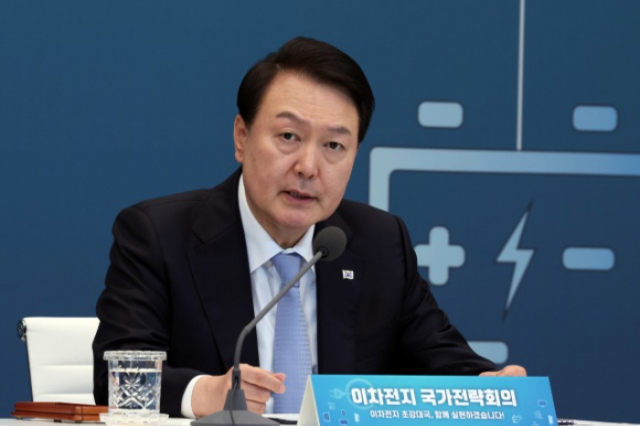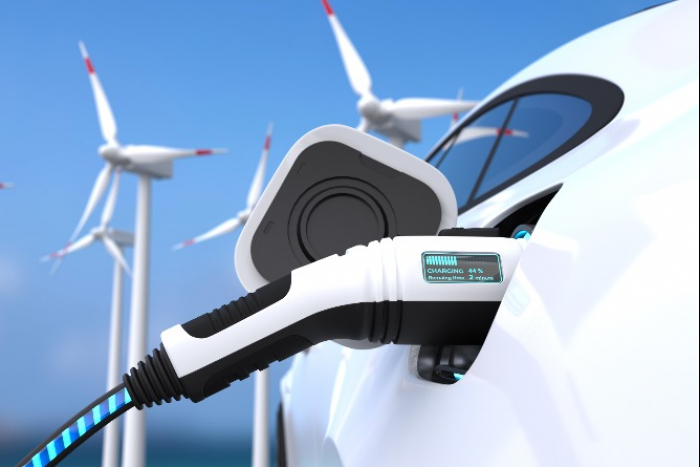Batteries
S.Korea to inject $15 bn in rechargeable battery sector by 2030
It will support companies to produce next-generation batteries, as well as build an ecosystem to extract minerals from used cells
By Apr 20, 2023 (Gmt+09:00)
3
Min read
Most Read
LG Chem to sell water filter business to Glenwood PE for $692 million


KT&G eyes overseas M&A after rejecting activist fund's offer


Kyobo Life poised to buy Japan’s SBI Group-owned savings bank


StockX in merger talks with Naver’s online reseller Kream


Meritz backs half of ex-manager’s $210 mn hedge fund



South Korea will invest 20 trillion won ($15.1 billion) in the rechargeable battery sector by 2030 to widen its technology gap with global competitors, President Yoon Suk Yeol said at a meeting with business leaders on Thursday.
"Korea, which has been one of the biggest players in the global rechargeable battery market, is facing growing challenges. The government will fully support Korean companies to be more competitive in the high-tech industry,” Yoon said at the national strategy meeting.
At the meeting, Lee Chang-yang, Minister of Trade, Industry and Energy, announced a plan to start manufacturing next-generation batteries, such as solid-state batteries, 4680-type cylindrical batteries and cobalt-free batteries, in Korea and mass produce them overseas.
Lee also reconfirmed that the government will nurture its materials, parts and facilities industries and ramp up production of battery components.
Among the attendees were Kwon Young-soo, vice chairman of LG Energy Solution, Ji Dong-seob, chief executive of SK On Co., Choi Yoon-ho, chief executive of Samsung SDI Co., and Chang Jae-hoon, executive vice president of Hyundai Motor Co.
SOLID-STATE BATTERIES
The government will invest in three top battery makers, LG Energy Solution Ltd., Samsung SDI and SK On, to set up facilities in Korea to produce solid-state battery prototypes.
Solid-state batteries are regarded as a game changer in the battery industry as have less of a fire hazard and a longer life compared to existing lithium-ion batteries.

The government will also back research and development of lithium-metal batteries for longer driving range and lithium-sulfur batteries to reduce weight.
The government will also invest more than 350 billion won to strengthen Korea’s leadership in production of NCM batteries, comprised of nickel, cobalt and manganese, and expand its market share of lithium iron phosphate (LFP) batteries. The country will also increase exports of energy storage systems (ESS) more than fivefold by 2030.
REUSE OF WASTE CELLS
Korea is set to establish an ecosystem for cell materials, components and facilities, as well as waste batteries. The government plans to increase the investment tax credits to 15% from 8% for large companies and to 25% from 16% for small and medium-sized enterprises, while expanding the scope of the credits to include mineral processing. Those measures, which had been scheduled to expire next year, will be extended further.
The country aims to support equipment makers through R&D and policy funds of 500 billion won. The move is expected to more than quadruple the annual domestic cathode output to 1.6 million tons from 380,000 tons in the next five years, over trebling exports of facilities to $3.5 billion from $1.1 billion.
The authorities also plan to nurture the ecosystem of waste batteries as the business of extracting materials from used cells is predicted to be promising given the importance of mineral procurements. The country is set to establish a system to help the trade of waste batteries and their use in other industries, while considering special laws for the effective management of used cells.
Write to Byung-Uk Do and Han-Shin Park at dodo@hankyung.com
Jihyun Kim edited this article.
More to Read
-
 BatteriesKorean battery players LG, Samsung, SK sweep US EV tax credits
BatteriesKorean battery players LG, Samsung, SK sweep US EV tax creditsApr 19, 2023 (Gmt+09:00)
4 Min read -
 BatteriesSamsung SDI unveils super-gap battery tech aimed at Chinese market
BatteriesSamsung SDI unveils super-gap battery tech aimed at Chinese marketApr 18, 2023 (Gmt+09:00)
1 Min read -
 BatteriesLG Chairman to refine strategy for EV battery production
BatteriesLG Chairman to refine strategy for EV battery productionApr 18, 2023 (Gmt+09:00)
3 Min read -
 Korean stock marketPOSTECH hits jackpot with stakes in POSCO companies on battery boom
Korean stock marketPOSTECH hits jackpot with stakes in POSCO companies on battery boomApr 17, 2023 (Gmt+09:00)
4 Min read -
 BatteriesLS Group' corporate value soars as EV battery market grows
BatteriesLS Group' corporate value soars as EV battery market growsApr 11, 2023 (Gmt+09:00)
2 Min read
Comment 0
LOG IN


